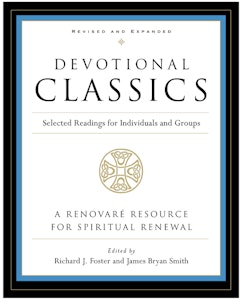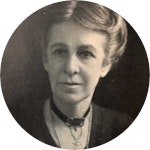Introductory Note:
It is an unreasonable, recurrent, soulful desire for intimacy with God that keeps me returning to the Christian prayer of meditation—though it confounds my over-ambitious expectations. In this excerpt on prayer, Evelyn Underhill is a wonderful spiritual director in helping me deal with my thinking, feeling, willing self.
When my intellect and emotions run contrary to my intention in prayer, she reminds me that it is notoriously useless to try to beat ourselves up to a froth: to make ourselves think more deeply or make ourselves care more intensely. . . . Even when our heart is cold and our mind is dim, prayer is still possible to us.
Whew. Amen. Thanks be to God.
Jean Nevills
 Excerpt from Devotional Classics
Excerpt from Devotional Classics
1. Stretching Out the Tentacles
In the first place, what do we mean by prayer? Surely just this: that part of our conscious life which is deliberately oriented towards, and exclusively responds to, spiritual reality. God is that spiritual reality, and we believe God to be immanent in all things: “He is not far from each one of us: for in him we live and move and have our being.”
“Prayer,” says Walter Hilton, “is nothing else but an ascending or getting up of the desire of the heart into God by withdrawing it from earthly thoughts.” It is “ascent,” says Ruysbroeck, of the Ladder of Love. In the same spirit William Law defines prayer as “the rising of the soul out of the vanity of time into the riches of eternity.”
It entails, then, a going up or out from our ordinary circle of earthly interests. Prayer stretches out the tentacles of our consciousness not so much towards that Divine Life which is felt to be enshrined within the striving, changeful world of things; but rather to that “Eternal truth, true Love, and loved Eternity” wherein the world is felt to be enshrined.
2. This Double Situation
The whole of a person’s life consists in a series of balanced responses to this Transcendent-Immanent Reality. Because we live under two orders, we are at once a citizen of Eternity and of Time. Like a pendulum, our consciousness moves perpetually — or should move if it is healthy — between God and our neighbor, between this world and that.
The wholeness, sanity, and balance of our existence depend entirely upon the perfection of our adjustment to this double situation; on the steady alternating beat of our outward adoration, and our homeward-turning swing of charity. Now, it is the outward swing which I want to consider: the powers that may be used in it, and the best way in which these powers may be employed.
3. Three Faculties
First, there are three capacities or faculties which we have under consideration — the thinking faculty, the feeling faculty, and the willing or acting faculty. These practically cover all the ways in which the self can react to other selves and other things. From the combination of these three come all the possibilities of self-expression which are open to us.
In our natural life we need to use all of them. Do we need them in our spiritual life, too? Christians are bound to answer this question in the affirmative. It is the whole person of intellect, of feeling, and of will which finds its only true objective in the Christian God.
4. Work and Rest
Prayer should take up and turn towards the spiritual order all the powers of our mental, emotional, and volitional life. Prayers should be the highest exercise of these powers; for here they are directed to the only adequate object of thought, of love, and of desire. It should, as it were, lift us to the top of our condition, and represent the fullest flowering of our consciousness. For here we breathe the air of the supernatural order, and attain according to our measure that communion with Reality for which we were made.
Prayer will include many different kinds of spiritual work; and also — what is too often forgotten — the priceless gift of spiritual rest. It will include many kinds of intercourse with Reality — adoration, petition, meditation, contemplation — and all the shades and varieties of these which religious writers have named and classified.
As in the natural order the living creature must feed and grow, must suffer and enjoy, must get energy from the world and give it back again if it is to live a whole and healthy life. So, too, in the spiritual order. All these things — the giving and the receiving, the work and the rest — should fall within the circle of prayer.
5. The Transition from Inaction to Action
Now, when we do anything consciously, the transition from inaction to action unfolds itself in a certain order. First, we form a concept of that which we shall do; the idea of it looms up in our minds. Second, we feel that we want to do it, or must do it. Third, we determine that we will do it. These phases may follow on another so swiftly that they seem to be fused into one; but when we analyze the process which lies behind each conscious act, we find that this is the normal sequence of development.
First we think, then we feel, then we will. This little generalization must not be pressed too hard; but it is broadly true, and gives us a starting-point to trace out the way in which the three main powers of the self act in prayer. It is important to know how they act or should act.
6. An Active and Disciplined Intelligence
Prayer, as a rule, should begin with something we usually call an intellectual act, with thinking of what we are going to do. All the great writers on prayer take it as a matter of course that “meditation” comes before “oration” (or spoken prayer). Meditation is simply the art of thinking steadily and methodically about spiritual things. So, too, most modern psychologists assure us that instinctive emotion does its best work when it acts in harmony with our reasoning powers.
There are some who believe that when we turn to God we ought to leave our brains behind us. True, they will soon be left behind by necessity if we go far on the road towards God who is above all reason and all knowledge, for the Spirit swiftly overpasses these imperfect instruments. But those whose feet are still firmly planted upon earth gain nothing by anticipating this moment when reason is left behind; they will not attain the depths of prayer by the mere annihilation of their intelligence.
In saying this — in insisting that reason has a well-marked and necessary place in the soul’s approach to God — I am not advocating a religious intellectualism. I am well aware that it is “by love,” as the old mystic said, “God may be gotten and beheld; by thought never.” It is humility and love that are essential for successful prayer. But surely it is a mistake to suppose that these qualities cannot exist side by side with an active and disciplined intelligence.
7. Preparing the Consciousness
Prayer, then, begins by an intellectual adjustment. By thinking of God earnestly and humbly to the exclusion of other objects of thought, by deliberately surrendering the mind to spiritual things, by preparing the consciousness for the inflow of new life.
But having thought of God, the self, if it stops there, is no more in touch with God than it was before. We may think as long as we like, but nothing happens; thought unhelped by feeling ever remains apart from its object. The intellect is an essentially static thing: we cannot think our way along the royal road which leads to heaven.
8. The Industrious Will and the Passionate Heart
Where the office of thought ends, there the office of will and feeling begins: “Where the intellect must stay without,” says Ruysbroeck, “these may enter in.” Desire and intention are the most dynamic of our faculties; they do work. They are the true explorers of the Infinite, the instruments of our ascents to God. Reason comes to the foot of the mountain; it is the industrious will urged by the passionate heart which climbs the slope.
Experience endorses this emphasis on will and desire as central facts of our personality, the part of us which is supremely our own. In turning our will and desire towards Spiritual Reality we are doing all that we can of ourselves, we are selecting and deliberately concentrating upon it our passion and our power.
9. The Very Center and Art of Prayer
Now, intellect and feeling are not wholly in our control. They fluctuate from day to day, from hour to hour; they are dependent on many delicate adjustments. Sometimes we are mentally dull, sometimes we are emotionally flat. On such occasions it is notoriously useless to try to beat ourselves up to a froth: to make ourselves think more deeply or make ourselves care more intensely.
If the worth of our prayer life depended upon the maintenance of a constant high level of feeling or understanding, we would be in a dangerous place. Though these often seem to fail us, the reigning will remains. Even when our heart is cold and our mind is dim, prayer is still possible to us. “Our wills are ours, to make them Thine.”
The determined fixing of our will upon God, and pressing toward him steadily and without deflection; this is the very center and the art of prayer. The most theological of thoughts soon becomes inadequate; the most spiritual of emotions is only a fairweather breeze. Let the ship take advantage of it by all means, but not rely on it. She must be prepared to beat to windward if she would reach her goal.
Excerpts taken from Devotional Classics: Selected Readings for Individuals and Groups (Richard J. Foster & James Bryan Smith, Editors. HarperCollins, 1993.). Originally from The Essentials of Mysticism by Evelyn Underhill, published 1920.
Detail, Domenico del Ghirlandaio, Last Supper, Badia di Passignano Refectory
Text First Published December 1992 · Last Featured on Renovare.org February 2025


